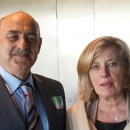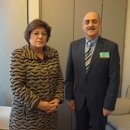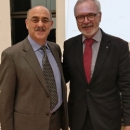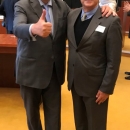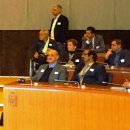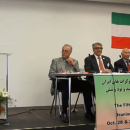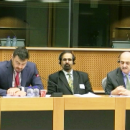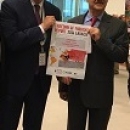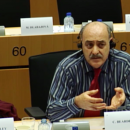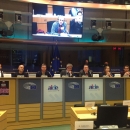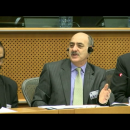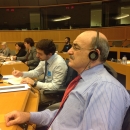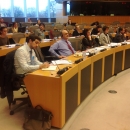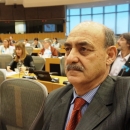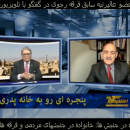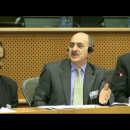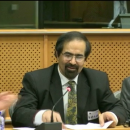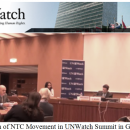Foreignpolicy.com
The gravest extremist threat in the Middle East isn’t the nation that just voted overwhelmingly for peaceful coexistence with the international community.

The Netherlands, France … Iran? Yes, Iran is now the third country in the first few months of 2017 to overwhelmingly embrace moderation and reject the false populism and extremist political philosophies represented by Donald Trump.
As the landslide re-election of President Hassan Rouhani shows, European and Iranian voters have more in common than they do differences. While voters in both continents were less than thrilled by the choices offered them, fed up with empty campaign promises, and sick of a ruling class that cares little for the common man, neither population was willing to cut off its proverbial nose to spite its face. In the age of regret that has followed Brexit and the U.S. presidential election, lodging a protest vote or sitting out an election to express disgust with the political class, tempting as that may have been to some, was simply not an option.
You would not know this, however, by listening to Donald Trump. In his remarks in Saudi Arabia last weekend, he accused Iran of essentially being the most malevolent force on the planet — the irony of speaking those words in the ideological birthplace of al Qaeda and the Islamic State was apparently lost on his speechwriters.
So far, such rhetoric has not met with especially strong reactions in Tehran. Rouhani suggested at his first press conference after the election that Iran will wait to react until things “settle down” in the U.S. administration, which could mean that he hopes saner minds will prevail in formulating an Iran policy — or alternatively, and less likely, that Tehran is anticipating a badly damaged presidency that will hardly have the ability to confront it.
Iran’s presidential election also proved the adage that the only thing predictable about Iranian politics is its unpredictability.
Iran’s presidential election also proved the adage that the only thing predictable about Iranian politics is its unpredictability. Which, to the consternation of the Washington foreign-policy class, puts Iran experts on the same professional level as astrologers or palm readers. The election that extended Rouhani’s presidency into a second four-year term was at first meant, according to pundits, to be a cakewalk for him, then a struggle with a dramatis personae that signaled the ascendancy of a supposed favorite cleric of the establishment, Ebrahim Raisi, and a suave mayor of Tehran, Mohammad Baqer Qalibaf. Both candidates challenged Rouhani in three televised debates on his one perceived weakness: improving ordinary folks’ economic lives. And then finally, with Qalibaf dropping out of the race at the last minute and throwing his weight behind the Raisi campaign, unifying the conservatives and hard-liners, the race was deemed to be too close to call, despite some polls showing Rouhani as the favorite.There were a number of problems with various analyses that suggested Rouhani might be in trouble. First, the idea that Qalibaf’s withdrawal favored Raisi was incorrect: If Qalibaf had stayed in the race, the danger for Rouhani of not gaining a majority in the first round and having to battle a runner-up in a second round one week later would have been real. A second round, as in 2005, would probably favor the challenger, as it would both provide more time to rally supporters and would reveal a weakness in the incumbent. And Iranians are not known to reward weakness.
If Supreme Leader Ayatollah Ali Khamenei truly favored Raisi, as most believed, then a second round would have been the best way — short of rigging — to influence the election in his favor. After all, it would have been a rather simple matter for Ayatollah Khamenei to ask his onetime commander of the Islamic Revolutionary Guard Corps, Qalibaf, to stay in the race. It was also a simple matter for Khamenei to ask him to step aside, if the preferred outcome was a second term for Rouhani — and if the nezam, or system, wanted to engineer that result, there was no better way to do so.
The idea that Raisi was Khamenei’s pick as his successor, promoted in both Persian- and English-language media for months, and his candidacy as a step toward that goal was also probably another misreading of the supreme leader. It’s true that the presidency might pave the way for a little-known cleric to assume Iran’s highest post, but it’s equally true that an ignominious defeat in a presidential election — an outcome more likely than not for Raisi — has the potential of permanently spoiling such chances. One might wonder whether it was precisely for that reason that the supreme leader allowed the cleric’s name to be put forward. Iranian leaders have been known, after all, to out-Machiavelli the term’s namesake.
Neither the supreme leader of the Islamic Republic nor many of his close aides are stupid. Since his ascension to the position, Ayatollah Khamenei has allegedly favored one candidate or another in most presidential elections, and, with the exception of 2005, his preferred candidates have lost the legitimate popular vote.
Khamenei is not unaware that his conservative political views are out of fashion among the general population
Khamenei is not unaware that his conservative political views are out of fashion among the general population — particularly in the major cities and among the 60 percent of people under 30 years of age. One assumes that he is also acutely aware, while he rails against reliance on Western investments or outreach to the United States, that a return to the economic years of Mahmoud Ahmadinejad’s presidency — both in terms of sanctions imposed on Iran and the incompetent mismanagement of the economy — would not serve his legacy well.But this raises the question of what comes next. What will Rouhani, with even the presumed quiet backing of the supreme leader, accomplish in the next four years? Khamenei has shown himself willing to give the people some of the things they want some of the time — just not all the things they want all of the time. He is likely to continue that strategy: He will always be mindful of his right flank and give hard-liners latitude to continue to present obstacles to Rouhani’s agenda, using them to also ensure that the president and the reformists who support him don’t get too big for their boots. But he will also probably give his assent to some initiatives that will allow for an improvement in the economy while simultaneously giving some room to the youth to enjoy the social benefits that an improved economic situation should provide.
Human rights will not improve overnight, and prisoners in Evin’s political wing and the detainees imprisoned in their homes will not suddenly be released. Rouhani’s promise to improve the lot of the youth yearning for more political freedoms, for less social restrictions, and for freedom of speech has always come with the caveat that those reforms will have to arrive through consensus within the nezam — not as executive orders from the administration. He has publicly called for more freedoms, fewer arrests — especially for social crimes such as dancing in videos — and has challenged the judiciary on those issues on more than one occasion. But in the now smoke-free rooms of the former palaces of the Shah, horse-trading and cajoling will be the order of the day.
President Rouhani has a stronger mandate than he had in 2013. After beginning his political career as a conservative, morphing into a moderate who successfully resolved the nuclear crisis with diplomacy, and now transforming into what some would say was a rabid liberal reformist in the last two weeks of his campaign, he will be better equipped to address some of the inequities of the system rather than ignoring them, as he did in his first term, in order to secure a nuclear deal. He won’t be operating in a vacuum, however, and apart from his hard-line critics, the outside party most able to affect his ability to pursue his agenda is, of course, the United States.
Four months into his presidency, it is unclear what exactly Trump wants to do with or about Iran. Secretary of State Rex Tillerson has spoken about “reviewing” the nuclear deal to see if it is in the national interest of the United States, which the Iranians argue is in itself a violation of U.S. commitments.
But despite whatever has been whispered into the ear of President Trump in Riyadh or Jerusalem, there are 41 million reasons why peace, and the eradication of terrorist groups in the Middle East, will not be possible without Iran’s participation. A smarter U.S. policy would take into account the fact that these tens of millions of Iranians voted for neither confrontation nor belligerence; rather, they cast their ballots for compromise, peaceful coexistence, and openness. Whatever the U.S. foreign policy toward Iran and the larger Middle East, one thing is clear: Iranians care about their country, care about their voices in its politics, and will support their president extending an open hand to the world. We should probably not — just to be different and for the sake of doing the opposite of whatever the Barack Obama administration did — show them our clenched fist.


